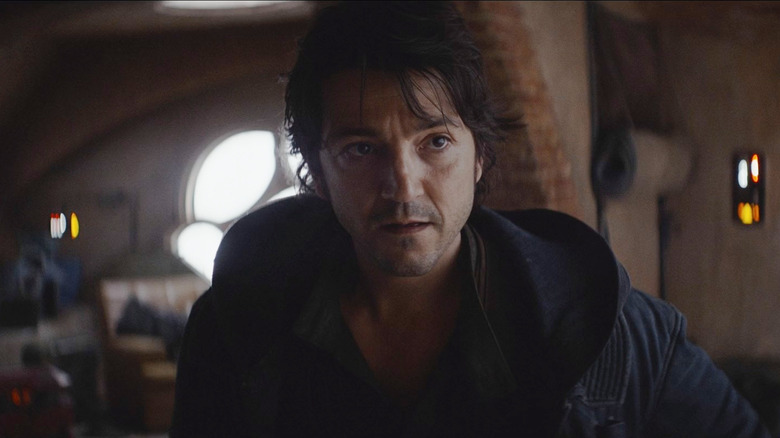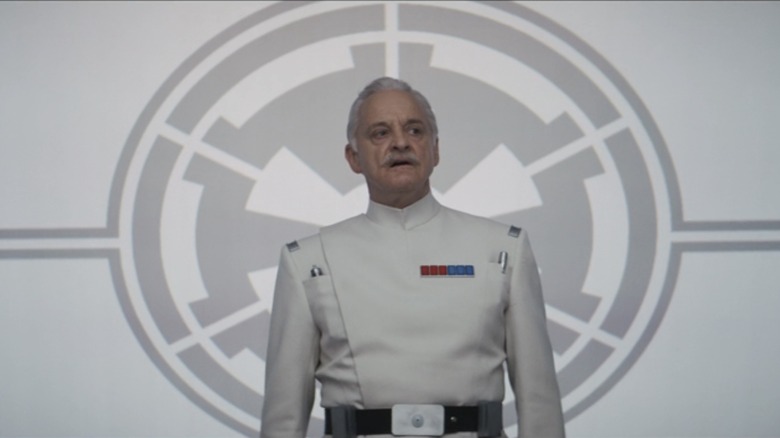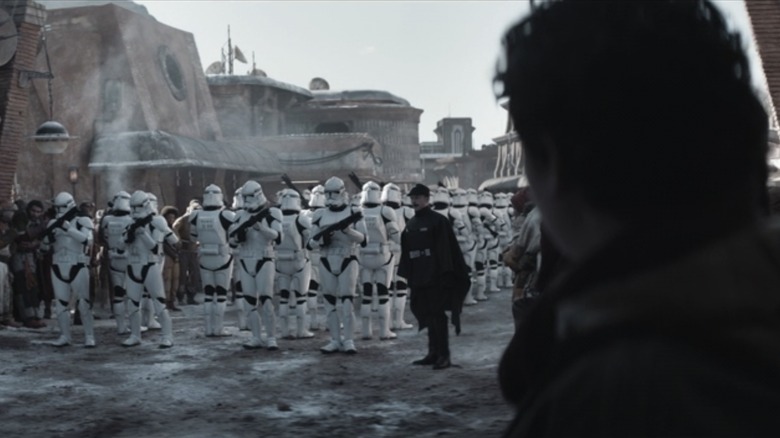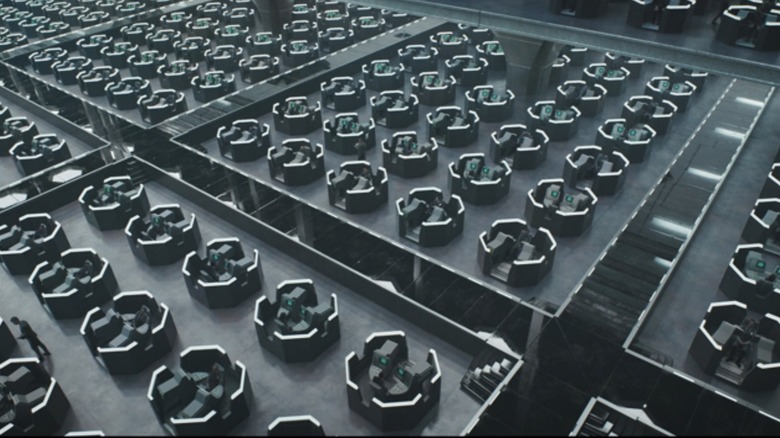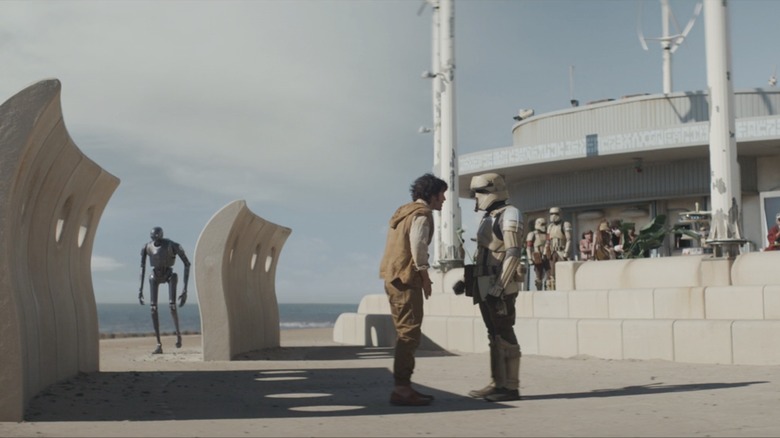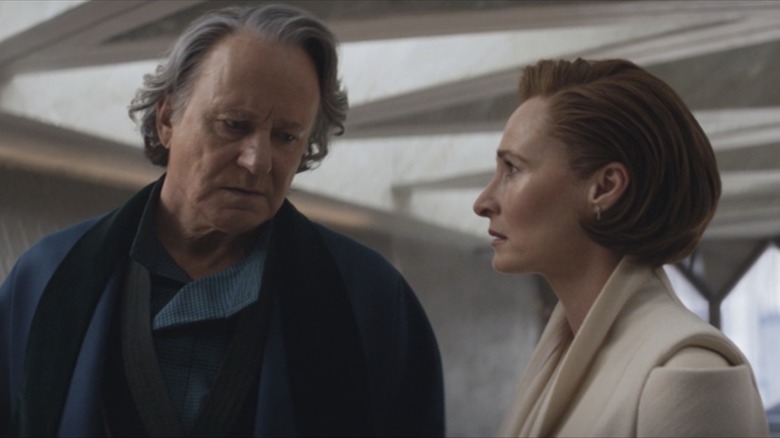Andor Episode 7 Puts Everyone In A Prison Of Their Own Making
There will be spoilers for "Andor" Episode VII – "Announcement"
"Announcement," the seventh episode of "Andor," shows us that everyone in a fascist galaxy is living in a prison of some kind. As news of the heist on Aldhani reaches Coruscant, the Emperor — by way of the Imperial Security Bureau — cracks down on rebel activity across the galaxy, tightening his grip. Life is made more difficult for every character as the walls close in.
Mon Mothma (Genevieve O'Reilly) flounders for more allies. Luthen Rael (Stellan Skarsgård) struggles to tie up loose ends and keep himself from being exposed. Syril Karn (Kyle Soller) struggles to find a place in a system that discarded him. For his part, Cassian Andor (Diego Luna) foolishly goes back home to Ferrix to find out the boot of Imperial oppression is standing on the throats of all of his loved ones. With little recourse and his mother refusing to go with him, opting to fight against the Empire instead, Cassian skips town again with the score from Aldhani. Unfortunately for Cassian, the Empire doesn't care how guilty a person is and sweeps him up into custody for something he didn't actually even do.
How will any of the characters escape their prisons? There are five episodes of the season left to find out.
Fascism closes its fist
Admiral Wulff Yularen (Malcolm Sinclair) has spoken to the Emperor himself and the consequences for the galaxy in the face of the Aldhani robbery will be fierce. This bureaucracy racing to outdo itself in closing its fist around the populace is a perfect example of the banality of evil. All of these people jockey for position on how best to choke the life from the people of the galaxy as viscerally and literally as that KX-series droid choking Cassian against the wall at the end of the episode.
As Dedra Meero (Denise Gough) is able to obtain more power in the ISB, she can actually see the pattern of theft and rebel strikes. With her ability to buck command in order to follow her instincts, she is going to single-handedly make life as difficult as possible for Luthen, Maarva, and anyone else playing a part in the Rebellion.
If there is anything that fascism needs to thrive, it is cogs to be ground through its machine. "Andor" shows us more and more of these cogs and the snags they find and the terror they unleash when they grind together.
Like all of the characters on the show, though, even those in positions of power are in prisons of some kind, as Partagaz (Anton Lesser) reminds Dedra to watch her back, even in the wake of her victory in the boardroom. No one is safe, no matter how high up the chain of command they are.
Seeds of rebellion
The show provides glimpses into the past and futures of two of its main characters. First, is Mon Mothma. We're offered a window into her past as she tries to recruit a childhood friend to the effort—the same one she spoke to Luthen about. We get hints of her past in school and her stoic ways, and no one would suspect her of being a part of the nascent rebellion. Everyone perceives her as a minor and polite irritation to the Empire, not a serious threat, but that's because of the way she's forced to talk out of both sides of her mouth. She has to speak in careful metaphors and smile when she's being serious—something she might have learned from Luthen. She's a prisoner in her own home, unable to trust her family, her driver, or anyone close to her. She has to maintain a carefully manicured public persona, remain dedicated to humanitarian efforts and charities, and never let anyone know she's really working for something bigger and better for the whole galaxy.
For Cassian, we see two important keys in his life. First, we get a window into the past and see the Stormtroopers (fresh from service in the Clone Wars, you can see it in their masks) occupying Ferrix and hanging his father. We also understand why he might have been sent to that camp as a kid, back when the sentence for a crime as severe as attacking Stormtroopers must have been much lighter. As the walls of the prison of his own making close in on him, he's sentenced to a harsher sentence for crimes he didn't even commit. This injustice will need to be answered. Between this affront of the courts and Maarva's desperate pleas to fight against the Empire, this will go a long way to giving us a look at the Cassian we know from "Rogue One: A Star Wars Story": A Cassian willing to risk his life for the benefit of the galaxy.
This entire flashback sequence also evokes the Boston Massacre as well, where Crispus Attucks was the first American killed in the Revolution. Clem feels very much as though he's filling that role and this is the shot heard 'round Cassian's world.
The film influences
Two films I want to call out that feel quite heavily referenced in this episode are "THX-1138" and "The Apartment."
The entire Imperial Security Bureau is overly-bright with white walls, much like the dystopian future of George Lucas's early masterpiece, "THX-1138." This nightmarish hell seems to be permeating further and further into the bowels of Coruscant and the Empire is truly the fascist, conservative government that Lucas lampooned in that film. (I've written about that in the past and you can read more about that here.) But beyond that, there's another subtle nod to the movie in this episode. As Kleya makes her way through sets that look remarkably similar to some that called "THX-1138" home, static over the radio calls out the designation "L-U-H-three-one-four..." THX-1138's wife in the film, played by Maggie McOmie, is designated LUH-3147. George Lucas included references to "THX-1138" in most of his movies and projects, it's nice to see Andor doing it a little more subtly.
The other movie, "The Apartment," has some thematic and visual significance to this particular episode of "Andor" as well. "The Apartment" was Billy Wilder's 1960 masterpiece, sharply written and acted. But how can a romantic comedy be influencing this show? Well, when we look at the story of Syril Karn, we see a lot of Jack Lemmon's Buddy Boy. He's trapped in a corporate machine, doing what he needs to in order to get ahead. Like Buddy Boy, he has to swallow his pride a lot.
But there's a visual connection that makes an even stronger case. In "The Apartment", the nightmarish prison of corporate life is represented by the office building. Rows of desks stretching to infinity are an expansive prison for those climbing the corporate ladder, and it's exactly this sort of prison we see Syril resigned to at the end of the episode. He's even put on the uniform of his jailers, trading his tailored brown suit for the muted grays of the Empire. It's such a nice, smart touch. "The Apartment" is one of those movies that writers lose their minds over because it's so well written, and it's no wonder that the writers of "Andor" would find inspiration from it.
Details to watch out for
There are three major details worth pointing out from this episode of "Andor" in addition to those above. First would be the inclusion of Admiral Yularen. Yularen is the ISB officer at the beginning of the episode that said that he has spoken to the Emperor and is changing the way things are working. Yularen was present on the Death Star in "Star Wars: Episode IV – A New Hope," the only officer in a white uniform. In "Star Wars: The Clone Wars," Yularen (voiced by Tom Kane), worked closely with Jedi General Anakin Skywalker in the Republic Navy before taking his commission in intelligence. He's an important player in the "Star Wars" universe and his inclusion means quite a bit.
Second, the mention of the Ord Mantell system. This is a bit of an Easter egg referencing "Star Wars: Episode V – The Empire Strikes Back." Ord Mantell was the planet where Han and Leia found themselves harassed by a bounty hunter. That was the incident that changed Han Solo's mind about staying with the Rebellion and turning back to pay off his old debts. It didn't work out for him, but it's nice to know the inspirations for that move are getting more play in the canon.
The last is the inclusion of the Shoretroopers. These sandy-colored Stormtroopers were first created for "Rogue One: A Star Wars Story" and haven't been used outside of that film a whole lot since their creation, but it's nice to see them used here. In "Andor," we see them patrolling the shores of Niamos, a new, tropical beach planet where Cassian hides from his crimes under the name of Keef. There were also KX-series droids there, the same make and model as K-2SO, Cassian's companion in "Rogue One." They clearly aren't as friendly without the hacked programming.
Where to next?
"Andor" episode 7 really shows us how difficult and stressful life is for everyone living under the boot of the Empire. Some of these are prisons of their own making, some are more metaphorical than others. But everyone is living in a sort of hell and it's fascinating to watch the degrees of hell they have to endure. As the episode closes on Syril's new hell, we're left to imagine that to him, this prison is just as bad as the one Cassian has been relegated to on Niamos.
We know that Cassian doesn't serve his sentence — six years would release him after the events of "Rogue One" — so it will be interesting to see how he escapes. But it might be even more interesting to see how Mon Mothma escapes hers and makes it to Yavin IV, and how Syril escapes his and leads the life of dignity and significance he wants. The only person who seems to be free in this episode is Maarva, who insists that they can build all the barracks they want to, they can't cage her because she's finally answering the call to resist.
Is resisting the way we free ourselves from our literal and figurative prisons? It seems likely. Next week, we'll get more answers. In the meantime, we'll have to do our best to escape our own prisons.
New episodes of "Andor" air on Wednesdays on Disney+.
